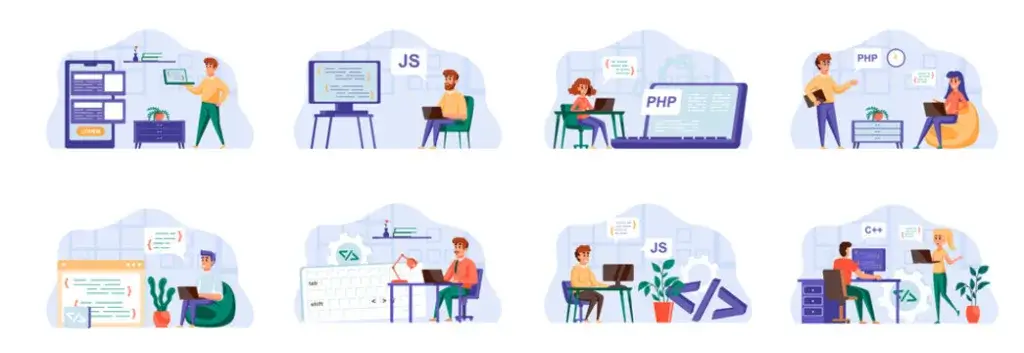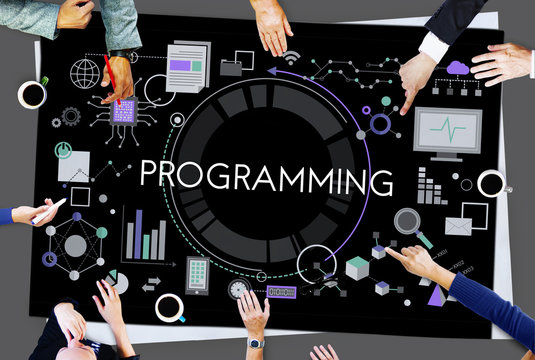
In today’s digital age, understanding and communicating with computers is becoming increasingly important. Learning a computer language can open up a whole new world of possibilities, from building your website to developing an app or software. But with so many programming languages out there, it can be overwhelming to know where to start.
In this essential guide, we’ll break down the basics of computer language and provide you with everything you need to know to get started on your coding journey. So whether you’re a complete beginner or have some experience under your belt, read on to discover the fundamentals of computer language and take your first steps towards becoming a coding master.
Understanding the Basics of Computer Language
Computer language is the backbone of all software development. It is a set of instructions that tells a computer what to do. Like human languages, computer languages have unique grammar and vocabulary. Learning computer language is essential for anyone who wants to become a programmer or develop software applications. It allows you to communicate with computers and create programs that can automate tasks, solve problems, and even create new technologies.
Understanding the basics of computer language is the first step toward becoming a proficient programmer. It involves learning about the different types of programming languages, their syntax and structure, and how to choose the right language for your needs. With dedication and practice, anyone can learn to code in a computer language and start building amazing software applications.

Why Learning Computer Language is Essential for Programmers
Learning computer language is now an essential skill for programmers who wish to succeed in the tech industry. With the rise of automation and artificial intelligence, developers must have a thorough understanding of programming languages to create functional applications that can automate everyday tasks.
Computer language skills are also necessary for non-technical professionals who work hand-in-hand with programmers such as project managers, product owners, or quality assurance Analysts. They need to understand technical jargon and how tech products function at their core so that they can communicate better with developers.
Apart from helping you land your dream job, learning computer language basics will allow you to enhance your problem-solving skills outside of coding as well. By mastering this skillset, you’ll learn how computers process information and translate them into actions or outcomes – valuable knowledge regardless of one’s career path.
Exploring Different Types of Computer Languages
Computer languages can be broadly categorized into two types: high-level and low-level. High-level languages are designed to be easy for humans to read and write, while low-level languages use machine code that is specific to the computer’s hardware. Some popular high-level languages include Python, Java, and Ruby, while examples of low-level languages include assembly language and machine code.
Within each category, further subdivisions are depending on the purpose of the language. For example, some programming languages like C++ or Swift are primarily used for building applications while others such as SQL or Haskell are specialized in dealing with data querying.
It’s important to note that different programming tasks may require a combination of different types of programming language expertise from a programmer or developer team. Understanding these distinctions can help you choose which language(s) will be most appropriate for your project needs.
How to Choose the Right Programming Language for Your Needs
Choosing the right programming language for your needs is crucial when learning computer language. Some key factors to consider include the purpose of your project and your interests and strengths.
If you are interested in web development, languages such as HTML, CSS, and JavaScript may be a good starting point. For game development, you may want to explore languages like C++ or Java. If you’re interested in data analysis or machine learning, Python is a popular choice.
It’s important to also consider the popularity and community support behind a language. Popular languages often have strong communities with helpful resources for beginners.
Ultimately, it’s important to choose a language that aligns with both your immediate goals and long-term ambitions within the field. Remember that while learning one programming language can make it easier to learn others in the future, investing time in mastering one specific language first can set you on the path toward success.
The Fundamentals of Syntax and Structure in Computer Languages
Syntax and structure are the building blocks of any computer language. Syntax refers to the rules for writing code, such as how to format statements and use punctuation. The structure is how those statements fit together to create a functional program. Understanding these fundamental concepts is crucial for mastering any programming language.
In most languages, statements are executed in a specific order from top to bottom, so understanding control flow structures like loops and conditional statements is essential. Variables allow us to store data that can be used later in our code or manipulated with functions.
It’s important to note that syntax and structure can differ greatly between programming languages. Some languages may require more verbose syntax than others, while some may have stricter rules on indentation or parenthesis usage. Learning each language’s unique quirks will help you write clean, efficient code that runs smoothly across different platforms.
Overall, taking the time to understand the basics of syntax and structure will save you countless hours of frustration down the line when debugging your code or trying to implement new features.
Tips and Tricks for Learning a New Programming Language Quickly
Start Small and Build Up: Breaking Down Complex Code into Manageable Chunks
When learning a new computer language, it can be overwhelming to try and tackle complex code right away. To make the process more manageable, start small and build up your knowledge gradually. Focus on understanding the basics first, such as variables, loops, and conditional statements.
Once you have a solid foundation, move on to more advanced concepts. Breaking down complex code into smaller, more manageable chunks can also help you avoid feeling overwhelmed. By taking your time and building up your knowledge gradually, you’ll be able to learn a new programming language quickly and effectively. Don’t forget to practice regularly and seek out additional resources when needed.
Embracing Your Inner “Syntax Detective”: Key Strategies for Unraveling New Programming Languages
One of the essential tips for learning a new programming language is to become an expert syntax detective. To do this, you need to pay close attention to every word and character in the code.
Start with exploring basic definitions and rules that govern codes in the computer language. Look up unfamiliar terms or symbols, read documentation or tutorials on official websites, and join discussion forums where experts share their insights.
Another key strategy is checking frequently-used libraries or frameworks as they can help you quickly understand how specific commands work within your chosen language. Lastly, spend plenty of time practicing by writing small programs or solving problems using your newfound knowledge – repetition is vital for building familiarity with any computer language!
Getting Hands-On: Practicing Coding Basics with Simple Projects and Exercises
One of the best ways to learn a new computer language quickly is to get hands-on with coding basics through simple projects and exercises. Start by practicing the fundamentals of syntax and structure, paying close attention to variables, loops, and conditional statements. Use online resources like tutorials and forums to find sample code and exercises that you can work through at your own pace.
As you become more comfortable with the language, challenge yourself with more complex projects that incorporate multiple concepts. Don’t be afraid to make mistakes – debugging is an essential part of the learning process. With consistent practice and dedication, you’ll be able to master a new programming language in no time.
Tapping into the Power of Community: How Collaboration Can Accelerate Your Learning Process
Collaborating with other programmers can greatly accelerate your learning process when it comes to mastering a new computer language. Joining online forums, attending local meetups or hackathons, and participating in open-source projects are all great ways to tap into the power of community. Not only will you have access to valuable resources and feedback from more experienced developers, but you’ll also have a support system that can help keep you motivated and accountable. Through collaboration, you may even discover new techniques or tools that can make learning a programming language easier and faster than going at it alone.

Breaking Down Key Concepts: Variables, Loops, and Conditional Statements
Variables, loops, and conditional statements are three fundamental concepts that make up the building blocks of any computer program. Understanding how these concepts work is crucial to writing effective code in any programming language.
Variables allow programmers to store data such as numbers, strings, or boolean values which can be manipulated later in the program. Loops enable programs to repeat a set of instructions multiple times until a certain condition is met. On the other hand, conditional statements execute specific codes only if certain conditions are true.
It’s important to keep in mind that each programming language may have its own syntax rules for writing variables and using loops and conditional statements. Taking some time to practice coding with these concepts will help you become more comfortable with them over time.
One tip for mastering these fundamentals quickly is by practicing on small projects that utilize each concept separately before combining them into larger programs. Additionally, reviewing sample code from experienced developers can provide valuable insights into best practices for using variables, loops, and conditional statements effectively in different situations.

Common Mistakes to Avoid When Writing Code in a New Language
When learning a new programming language, it’s important to be aware of common mistakes that can hinder your progress. One of the most common mistakes is not paying attention to syntax. Each programming language has its own set of syntax rules, and failing to follow them can result in errors. Another mistake is not properly commenting on your code.
Comments are essential for understanding what your code does and why you wrote it a certain way. Additionally, it’s important to avoid hardcoding values in your code. Instead, use variables and constants to make your code more flexible and easier to maintain. Finally, be sure to test your code thoroughly before deploying it. This will help you catch any errors or bugs before they become bigger problems down the line.

Mastering Debugging Techniques to Improve Your Code Efficiency
Debugging is an essential skill for any programmer. It involves finding and fixing errors, also known as bugs, in your code. To become proficient in debugging techniques, it’s important to first understand the types of bugs that you might encounter while programming. Common programming bugs include syntax errors, runtime errors, and logical errors.
Syntax errors occur when there’s a mistake in the way you’ve written code – like forgetting to close a bracket or misspelling a word. Runtime errors happen during the execution of your program and usually occur because data isn’t properly handled or that memory has been allocated incorrectly. Logical errors are the trickiest to fix since they don’t cause error messages but rather cause incorrect results.
To debug effectively, start by reproducing the error so you can see what happened leading up to it. Once you’ve identified where the bug is happening try using tools such as print statements or debuggers that help trace back what has happened during runtime. You can then use this information to locate where something went wrong and make necessary changes before head-scratching over why things aren’t working!
Best Practices for Using Online Resources to Learn a New Programming Skill
Online resources are an invaluable tool when learning a new programming language. There are countless websites, forums, and online communities dedicated to helping programmers of all levels improve their skills. One best practice is to start with beginner-friendly tutorials and exercises before moving on to more advanced topics. It’s also important to find reputable sources that provide accurate information and up-to-date content.
Another way to make the most of online resources is by participating in online communities such as GitHub or Stack Overflow. These platforms not only offer a vast amount of knowledge but also allow you to connect with other developers who can help answer questions, offer feedback on your code, and even collaborate on projects.
Lastly, it’s essential to keep in mind that online resources shouldn’t be used as a crutch for learning computer languages entirely. Practice writing programs independently using the concepts you’ve learned through those sites- coding challenges will give practical experience allowing one to learn faster while improving problem-solving skills.
In conclusion, learning a computer language is essential for anyone interested in pursuing a career in programming or computer science. It opens up a world of opportunities and allows you to create incredible software that can change the world.
By understanding the basics of various computer languages, choosing the right one for your needs, mastering syntax, and structure, breaking down key concepts like variables and loops, avoiding common mistakes when writing code, debugging efficiently, and using online resources effectively – you can become an expert programmer! So take advantage of these tips and tricks to accelerate your learning process today!
Questions and Answers
Who uses computer language?
Programmers, developers, and engineers use computer language.
What is computer language?
Computer language is a set of instructions that computers can understand.
How many types of computer languages are there?
There are hundreds of computer languages, each with its unique syntax.
What is the most popular computer language?
The most popular computer language is JavaScript, followed by Python.
How difficult is it to learn computer language?
It depends on the language, but learning computer language takes time and practice.
But I don’t have a technical background, can I still learn computer language?
Yes, there are beginner-friendly languages like Python and resources available online like w3school.
